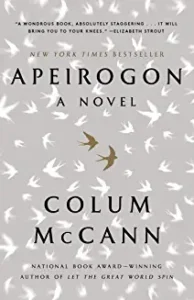Apeirogon by Colum McCann 2020
This is a difficult book to review without writing a thesis-long exposition, but I’ll try and will begin by saying that it’s a remarkable and important book.
McCann is the Irish-born, NYC-living, Hunter College-teaching, prize-winning author of 7 novels and three short story collections. His ‘As the Great World Turns’ and ‘Transatlantic’ are among my favorite books, and this one tops even those. When it was first published, I attended an interview at WBUR on March 4, 2020 where Claire Messud interviewed McCann while Rami Elhanan and Bassam Aramin were present on the stage and commented at times. It was a powerful experience made even more powerful by the gathering storm of COVID. As is my wont, I immediately developed an approach-avoidance relationship with the book as I do with almost all literature about Israel and the Holocaust. I have taken this book out of the library on at least three occasions and failed to even open it until this time, and once I began to read, I could not put it down.
Both Rami and Bassam, as one quickly comes to think of them, lost daughters to the violence that has plagued Israel and the Palestinians for the last 75 years and beyond. Rami’s 14 year old daughter Smadar died in a suicide bombing in Jerusalem in 1997, and Bassam’s 10 year old daughter, Abir, died when an Israeli border guard fired a single rubber bullet striking her in the head while she was on recess from her school. Both men consumed by grief and anger eventually turned from revenge and violence to become leading spokesmen for peace in groups like The Parents Circle and Combatants for Peace. Rami had served in the IDF seeing combat in 1967 and 1973 and Bassam had been jailed for 7 years after being arrested for throwing grenades at IDF soldiers. The men became best friends traveling around the world speaking to anyone who would listen about the need for a peaceful solution while they were both attacked as traitors and worse at home. The story is told in 1001 chapters, most of them quite brief, often with several on one page. The chapters build from 1 to 500, peak at a chapter numbered 1001, and then decrease from 500 to the final chapter numbered 1. The two numbered 500 are long biographies of Rami and Bassam and the center of this symmetrical structure, 1001 summarizes their work for peace.
I’m not sure I understand McCann’s goal in using this structure, but the short chapters certainly work to create and sustain an agonizing tension as the stories unfold moving unexpectedly back and forth through time. Throughout the novel there are chapters that provide fascinating historical details as in the brief summary of Henry Shrapnel, a lieutenant in the Royal Artillery who first loaded cannons with metal debris in 1784 to increase their destructive power. We learn that Eliezer Ben Yehuda, after whom the street where Smadar died was named, was the prime force in moving Hebrew from a holy language to the secular tongue of modern Israel in the 1880’s. We learn that Bassam’s prison number was 220-284 which are the only amicable numbers below 1000 and were the initial connection which led to the friendship with an Israeli guard who was to become a professor of mathematics. (Amicable numbers are two numbers that result from the addition of all the numbers by which they can be divided!). McCann uses two creative geniuses to plumb the depths of the confusion and mess that is modern Israel—John Cage with his famous 4’33” of silence and Jose Luis Borges with his short story ‘Aleph’ which describes a point in space from which every other point in the universe can be viewed. Finally, though not credited, I’m quite sure that the occasional photograph of ocean waves are the prints or paintings of the Latvian artist Vija Celmins, one of my favorites, again raising the question of infinitude and the ever changing perspective on it.
I have done little justice to McCann’s masterful accomplishment and to the immense character and strength of Elhanan and Aramin. Would that their efforts were more successful. I was finally able to read this book because Susan and I are scheduled to go to Israel next month, our first visit in 52 years, and that visit is now, ironically, imperiled by a spike in violence in the West Bank and Jerusalem. Time will tell if we actually go.



